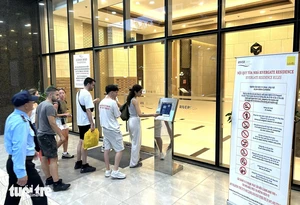
Foreign tourists at the Saigon River Gate apartment complex in District 4, Ho Chi Minh City. Photo: T.T.D. / Tuoi Tre
Ho Chi Minh City's Department of Tourism said it is contributing to a national framework to manage the booming home-sharing economy, including platforms like Airbnb.
The plan includes a dedicated legal framework, mandatory registration systems, digital monitoring tools, and inter-agency coordination.
While short-term rentals offer flexibility and help ease accommodation pressure during peak travel seasons, authorities say the lack of regulation—especially in apartment complexes—is creating risks for residents and undermining fair competition with hotels.
This service is popular with families and young travelers seeking local experiences, but it also brings legal grey zones, according to Le Truong Hien Hoa, deputy director of the city’s tourism department.
“We’re not banning it, but we need to manage it better," Hoa said.
Popular with travelers, problematic for cities
Platforms like Airbnb have become a key part of the global tourism landscape, offering lower-cost alternatives to hotels.
In Vietnam, families and foreign visitors frequently book apartments in cities like Ho Chi Minh City for short-term stays.
Tran Phuong Thao, a tourist from Hue City in central Vietnam, said renting a condo during holidays allows her family to cook and do laundry.
Anne Blunt, a UK visitor, said her family prefers short-term apartments for flexibility and price.
For hosts, the appeal lies in demand and relatively low barriers to entry.
“Some owners can offer deep discounts by managing the units themselves,” said Lo Thanh Diem, who rents out apartments online.
However, industry observers warn that the sector’s rapid, unregulated growth is straining residential buildings and city infrastructure.
“Originally Airbnb was for individual rooms, but now it sells everything from condos to hotels,” said Nguyen Chau A, founder of tour operator Oxalis Group.
“In peak seasons, it helps absorb tourist flows, but we must also ensure compliance.”
Policy push for a smarter legal framework
Vietnamese officials and tourism experts say regulating short-term rentals is necessary to ensure public safety, tax collection, and fairness in the hospitality sector.
Duong Duc Minh, deputy head of the Institute for Tourism and Economic Development Research, said the current legal vacuum has led to issues such as illegal business operations, tax evasion, uneven service quality, and challenges in security oversight—especially with foreign guests.
“It’s part of the broader sharing economy trend, so banning it isn’t the answer,” Minh said.
“We need a flexible, proactive legal framework that encourages growth while managing risks.”
He proposed introducing a licensing system, assigning a management code for each rental unit, and integrating booking platforms with government databases, including police, tax, and tourism authorities.
He also supports creating standardized alternatives, such as certified community-based homestays and licensed serviced apartments.
In high-density buildings, Minh and others say unit owners should be required to register with local authorities and comply with building management rules on security and business use.
Balancing tourism growth and community rights
While Vietnam seeks to promote tourism, policymakers say the rights of residents living in mixed-use buildings must also be protected.
“Tourism demand is surging, especially around holidays like April 30 [Vietnam’s Reunification Day], and flexible lodging helps fill the gap,” said Hoa from the Ho Chi Minh City tourism department.
“But the system must be transparent, legal, and safe.”
A government proposal is under review and expected to include digital monitoring tools, inter-agency coordination, and strict compliance requirements.
Officials say the goal is to develop a diverse and safe accommodation ecosystem that supports the digital economy without compromising public interests.




Max: 1500 characters
There are no comments yet. Be the first to comment.